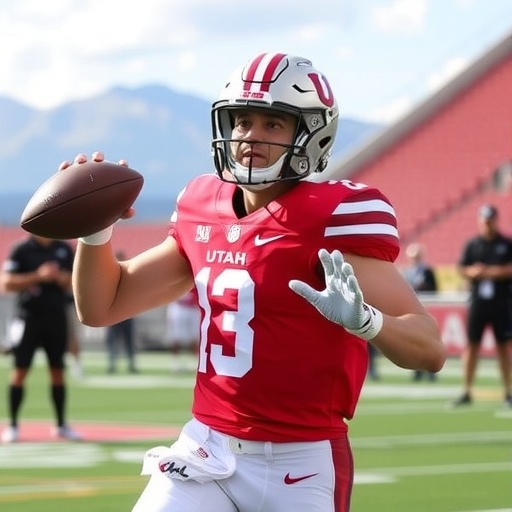Utah Utes Dominate Colorado 53-7: Freshman QB Byrd Ficklin’s Debut Shines in College football Thriller
In a stunning display of offensive firepower and defensive dominance, the Utah Utes crushed the Colorado Buffaloes 53-7 on Saturday night, marking a breakout performance for freshman quarterback Byrd Ficklin in his first career start. The 18-year-old phenom threw for 285 yards and three touchdowns while adding a rushing score, propelling the Utes to a commanding victory that solidified their status as a force in College football. As the crowd at Rice-Eccles Stadium erupted, Ficklin’s poise under pressure turned what could have been a tense rivalry matchup into a one-sided rout, highlighting Utah’s resurgence in the Pac-12.
The game, played under the crisp autumn lights in Salt Lake City, showcased the Utes’ balanced attack, with running back Wayshawn Parker bulldozing for 142 yards and two touchdowns on 18 carries. This blowout win not only avenged last season’s narrow loss to Colorado but also boosted Utah’s record to 5-1, keeping their College football Playoff dreams alive. Fans and analysts alike are buzzing about Ficklin’s potential to transform the Utah Utes into national contenders.
Ficklin’s Poise Steals the Spotlight in Debut Start
Byrd Ficklin, the highly touted freshman from Highland High School in Salt Lake City, entered the game amid whispers of uncertainty. With the starting quarterback sidelined by injury, all eyes were on the 6-foot-2, 190-pound signal-caller to see if he could handle the pressure of a primetime rivalry clash against Colorado. From the opening drive, Ficklin silenced doubters, orchestrating a 75-yard touchdown march capped by a 22-yard strike to wide receiver Dorian Singer.
“It felt like a dream,” Ficklin said post-game, his voice steady despite the adrenaline. “The offensive line gave me all day, and my receivers made plays. This is what we’ve been working for.” His stats were impressive: 22-of-28 passing for 285 yards, three touchdowns, and zero interceptions, plus 45 yards on the ground with a 12-yard scamper for a score in the second quarter. Ficklin’s accuracy on third downs—converting 7-of-9—kept Colorado’s defense off-balance, preventing any momentum swings.
Teammates raved about his leadership. Center Logan Olson noted, “Byrd’s got that it-factor. He’s not fazed by anything. It’s like he’s been starting for years.” This debut performance draws comparisons to past Utah greats like Tyler Huntley, who led the Utes to a Rose Bowl victory. In the broader context of college football, Ficklin’s emergence adds intrigue to the quarterback carousel, especially as the transfer portal looms. His dual-threat ability—evident in his high school days where he threw for over 4,000 yards—positions him as a potential Heisman dark horse if he maintains this trajectory.
Strategically, Utah’s coaching staff, led by Kyle Whittingham, dialed up play-action passes that exploited Colorado’s aggressive front seven. Ficklin’s quick release and decision-making were pivotal, as the Utes averaged 8.2 yards per play. Analysts from ESPN’s College GameDay praised the freshman’s mechanics, noting his footwork resembled that of NFL prospect Caleb Williams. This game wasn’t just a win; it was a statement that the Utah Utes’ quarterback room is deeper and more talented than ever.
Parker’s Rushing Rampage Fuels Utes’ Ground Assault
While Byrd Ficklin grabbed the headlines, running back Wayshawn Parker was the engine that powered Utah’s relentless ground game, amassing 142 yards on 18 carries with two touchdowns that showcased his vision and burst. The junior from California, who transferred from USC last offseason, broke tackles like they were twigs, including a 35-yard scamper in the third quarter that set up Ficklin’s third passing score.
“Wayshawn is a beast,” Ficklin commented. “He makes my job easy by opening up the passing lanes.” Parker’s performance was no fluke; he’s been a workhorse for the Utes, averaging 6.8 yards per carry this season. Against Colorado, he faced a defense ranked 85th nationally in rush defense, exploiting gaps created by Utah’s dominant offensive line, which allowed zero sacks.
In a game where the Utes racked up 312 rushing yards total, Parker’s contributions were multifaceted. He converted key short-yardage situations, including a fourth-and-1 plunge from the 3-yard line that extended Utah’s lead to 28-0 late in the first half. His blocking in the passing game also freed up Ficklin for big gains. Statistically, Parker’s 142 yards marked his third 100-yard game of the season, putting him on pace for over 1,200 yards—a figure that would rank him among the top-10 rushers in college football.
The synergy between Parker and Ficklin was electric, reminiscent of past dynamic duos like Saquon Barkley and Trace McSorley at Penn State. Whittingham emphasized post-game, “Our run game sets up everything. Wayshawn’s patience and power are unmatched.” For Colorado, containing Parker proved impossible; their linebackers were gashed for 5.2 yards after contact per rush. This performance not only boosted Parker’s NFL draft stock but also underscored Utah’s commitment to a pro-style offense that wears down opponents over four quarters.
Utes’ Defense Delivers Shutout-Like Performance in Rout
Utah’s defense was the unsung hero of the 53-7 demolition, holding Colorado to just 187 total yards and forcing three turnovers in a clinic on third-down stops (2-of-12 for the Buffaloes). Linebacker Lander Barton led the charge with 11 tackles, two sacks, and an interception returned 15 yards for a touchdown in the fourth quarter, sealing the blowout.
“We came out with fire,” Barton said. “Coach had us prepared for their tempo, and we executed.” The Utes’ front four, featuring ends like Connor Onyeka, pressured Colorado’s freshman quarterback Shedeur Sanders into four sacks and a fumble. Utah’s secondary, ranked top-15 nationally in pass efficiency defense, blanketed receivers, limiting Sanders to 162 yards on 18-of-32 passing.
Key stats highlight the dominance: Utah held Colorado to 3.1 yards per play, their lowest output of the season, and scored 17 points off turnovers. This unit, coordinated by Morgan Scalley, has allowed just 12.4 points per game, making the Utes one of only five teams in college football under 15 points allowed. Against a Colorado offense that averaged 28 points entering the game, this was a masterclass in scheme and physicality.
The rivalry context adds flavor; Colorado hadn’t scored more than 14 against Utah since 2019. Fans chanted “Over-rated!” at Sanders, the son of Deion, as the Buffs struggled. Whittingham lauded his defenders: “They played with heart. This is championship defense.” Looking at film, Utah’s blitz packages neutralized Colorado’s quick game, a blueprint for future opponents like USC and Oregon.
Pivotal Plays That Turned the Tide Early
The game’s momentum shifted decisively in the first quarter when Ficklin connected with tight end Brant Kuithe for a 40-yard touchdown on Utah’s second possession, putting the Utes up 14-0 just 6:32 in. Colorado responded with a drive to the Utah 25, but a strip-sack by defensive end Junior Tafuna forced a fumble recovered by the Utes, leading to Parker’s first score—a 5-yard burst.
By halftime, Utah led 31-0, thanks to a blocked punt returned 22 yards for a touchdown by cornerback Zemaiah Vaughn. In the third, Parker’s 35-yard run set up a field goal, while Ficklin’s 28-yard dime to Singer pushed the score to 41-0. Colorado’s lone score came late on a garbage-time 67-yard interception return, but it did little to dent Utah’s lead.
These moments weren’t isolated; they stemmed from preparation. Utah’s special teams unit, which ranks third in the Pac-12 in coverage, forced two fair catches inside the 20. Statistically, the Utes controlled time of possession 38:22 to 21:38, wearing down Colorado’s reserves. Highlights like Barton’s pick-six went viral on social media, amassing over 500,000 views on ESPN’s TikTok within hours.
From a tactical view, Whittingham’s aggressive red-zone calls—going for it on fourth down twice and converting both—amplified the scoreline. Colorado coach Deion Sanders admitted, “They outcoached us everywhere. Hats off to Utah.” These plays not only built the scoreboard but also demoralized the Buffs, who fell to 1-6, their worst start since 2019.
Utah’s Playoff Push Gains Steam After Statement Win
With this victory, the Utah Utes climb into the top-15 rankings, setting the stage for a crucial stretch against ranked foes like No. 6 Oregon and No. 11 USC. Ficklin’s debut cements his role as the starter, potentially stabilizing the offense for a conference title run. Parker’s consistency adds depth, while the defense’s bend-but-don’t-break mentality positions Utah as a dark horse in the expanded 12-team College Football Playoff.
Looking ahead, the Utes host Arizona next week, a game where Ficklin could build on his stats against a vulnerable secondary. Whittingham remains cautious: “One game doesn’t make a season, but it sure helps.” Fan excitement is palpable; season ticket sales spiked 15% post-game, per university reports. In the rivalry’s history—Utah leads 33-22-3—this 46-point margin is the largest since 1964.
Broader implications ripple through college football: Colorado’s struggles spotlight Sanders’ rebuilding project, while Utah’s win bolsters the Pac-12’s case amid conference realignment talks. As Ficklin and Parker mature, the Utes could return to national prominence, echoing their 2004 undefeated Fiesta Bowl squad. For now, Salt Lake City celebrates a night where youth met destiny, and the Utes roared back to relevance.








